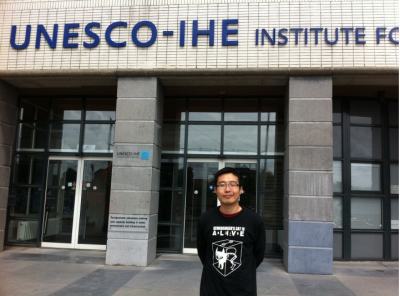Die Inhalte dieser Seite sind leider nicht auf Deutsch verfügbar.
Seitenpfad:
Kai Chu
Report of GLOMAR PhD student Kai Chu about his research stay at UNESCO-IHE in Delft, Netherlands, from 1 March - 31 May 2011
The UNESCO-IHE is an international institute for water education which was created in 2003. It carries out research, education and capacity building activities in the fields of water, environment and infrastructure.
During my research stay I worked with Professor Dano Roelvink from department of Coastal Engineering and Port Development. Professor Dano Roelvink has more than 20 years of experience in coastal engineering and research. Delft is also the home of numerical coastal modeling system Delft3D and Prof. Dano Roelvink’s working group has a prestigious reputation regarding the modeling of morphodynamic evolution. The main topic of my PhD research is long-term coastal morphodynamic modeling. Based on available observed bathymetric data, a 2DH model based on Delft3D was setup to study the erosion-and-sedimentation pattern of the Jade Estuary in the German Bight, Southern North Sea. The first purpose of my research stay is to further evaluate the Jade model. I have exchanged my research questions with Prof. Dano Roelvink and had many inspiring discussions with him and his colleagues. I received a lot of constructive comments and suggestions. The model performance is getting improved consequently and I gain more experience in modeling morphodynamics based on Delft3D.
The second objective of my research stay is to do data assimilation with morohodynamic models based on Delft3D. I have discussed my research ideas with Professor Dano Roelvink and people from Deltares in Delft who are working on data assimilation with numerical modeling especially on Delft3D models. Dr Julius Sumihar from Deltares has lots of experience in doing data assimilation with Delft3D. I have discussed my research idea of assimilating bathymetric data to Delft3D morphodynamic model with him and he recommended me to set up my research project by using OPENDA. OPENDA is an open interface toolbox developed by Deltares to quickly implement data-assimilation and calibration for numerical models. I received a lot of help from Dr Julius Sumihar in learning OPENDA to set up my own case study.
The research stay at UNESCO-IHE provided me valuable research experience which is very important to my following research work. I hereby express my appreciation to GLOMAR for providing me with financial support for my research stay.
During my research stay I worked with Professor Dano Roelvink from department of Coastal Engineering and Port Development. Professor Dano Roelvink has more than 20 years of experience in coastal engineering and research. Delft is also the home of numerical coastal modeling system Delft3D and Prof. Dano Roelvink’s working group has a prestigious reputation regarding the modeling of morphodynamic evolution. The main topic of my PhD research is long-term coastal morphodynamic modeling. Based on available observed bathymetric data, a 2DH model based on Delft3D was setup to study the erosion-and-sedimentation pattern of the Jade Estuary in the German Bight, Southern North Sea. The first purpose of my research stay is to further evaluate the Jade model. I have exchanged my research questions with Prof. Dano Roelvink and had many inspiring discussions with him and his colleagues. I received a lot of constructive comments and suggestions. The model performance is getting improved consequently and I gain more experience in modeling morphodynamics based on Delft3D.
The second objective of my research stay is to do data assimilation with morohodynamic models based on Delft3D. I have discussed my research ideas with Professor Dano Roelvink and people from Deltares in Delft who are working on data assimilation with numerical modeling especially on Delft3D models. Dr Julius Sumihar from Deltares has lots of experience in doing data assimilation with Delft3D. I have discussed my research idea of assimilating bathymetric data to Delft3D morphodynamic model with him and he recommended me to set up my research project by using OPENDA. OPENDA is an open interface toolbox developed by Deltares to quickly implement data-assimilation and calibration for numerical models. I received a lot of help from Dr Julius Sumihar in learning OPENDA to set up my own case study.
The research stay at UNESCO-IHE provided me valuable research experience which is very important to my following research work. I hereby express my appreciation to GLOMAR for providing me with financial support for my research stay.



